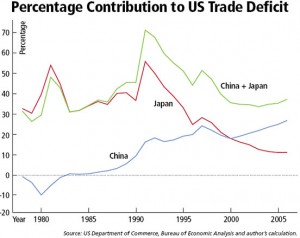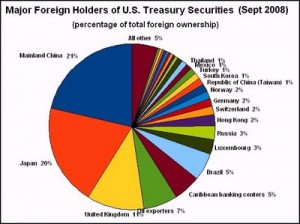
US China Japan Trade Deficit
The new government has indicated it will move towards economic integration in the far east, and away from close economic integration with the US. These two charts tell you why, and what it’ll mean for the US.
Japan has spent a lot of money keeping the Yeb low against the dollar in order to export to the US. Think Japan believes its getting its money worth, when China is eating its lunch on exports to the US? The strategy worked for decades, but it isn’t working any more, indeed this year the Japanese had their first annual trade deficit in 28 years. But unlike last time, this one comes when the “keep the Yuan low and export to the US” strategy has been in a multi year decline.
 Japan is going to be a lot less willing to finance US deficits and consumer spending than in the past, and economically it is going to be looking much more to other Asian nations.
Japan is going to be a lot less willing to finance US deficits and consumer spending than in the past, and economically it is going to be looking much more to other Asian nations.
In the long run this isn’t bad for the US. In the short run, it’s going to hurt.

Mandos
It’s totally amazing: this is hardly being covered at all, anywhere, in the blogosphere (except here). As far as I can tell.
Ian Welsh
Americablog had a post on the election result, but not what it means. Arguably Japan is the US’s most important ally (in some ways more important than Britian, even if Britian has been more willing to send troops on American adventures.) So understanding Japan is kind of important.
selise
mandos and ian – you all need to get out more (just joking). here is, imo, a very good post on what the change of gov in japan means (although not specifically for the usa) from one of my favorite (heterodox) econobloggers, bill mitchell: Japan – up against the neo-liberal machine
http://bilbo.economicoutlook.net/blog/?p=4679
i highly recommend both the post and the blog.
Pete Murphy
It’s a fact that over-crowding leads to low per capita consumption. For this reason, Japan, a nation ten times as densely populated as the U.S. and, thus, incapable of consuming at a rate needed to gainfully employ its labor force, is utterly dependent on exports to sustain its economy. It’ll take those exports wherever it can find them, including the U.S. No Toyota dealer is going to turn away a U.S. customer because of some decision on the part of Japanese strategists that they don’t like our business any more.
The problem Japan is having is that other badly overpopulated nations like China and India, just as dependent on exports, are beginning to muscle in on their export markets.
The huge disparity in population density between the U.S. and nations like Japan, Germany, China and many others is the root cause of the global trade imbalances that brought the global economy to its knees. It has bankrupted America while, at the same time, overpopulated nations remain entirely dependent on the trade imbalance to sustain themselves.
This situation will persist until economists once again are willing to ponder the implications of overpopulation. Only then might they come to understand the relationship between population density and per capita consumption, and what happens when nations grossly disparate in population density attempt to trade freely with one another.
Pete Murphy
Author, “Five Short Blasts”